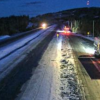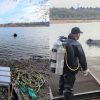The beautiful Okanagan isn’t known for harsh winters, but the past two years have been a bit more than the region is used to, or prefers.
Should we expect to see colder winters from now on? It’s hard to say, according to meteorologist Cindy Yu with Environment Canada. Yu says that although this winter wasn’t as cold as last year, it was above average in some ways.

Kelowna came close to breaking some record low temperatures overnight, but not quite. The lowest recorded temperature in Kelowna for the month of February is -22.3 C, on Feb. 1, 1996. The cold snap is expected to taper out over the next few days, with a promise of warmer weather in the near future.
This December through February, Kelowna did receive more than the normal amount of precipitation, making it a wetter than normal winter. We have also seen some above average snowfall, especially this month so far. February usually only sees about 10.8 cm of snow, but Kelowna has already had 18 cm before the month's end.
Last winter was also colder, although drier, but whether this is part of a cooling trend that will continue can’t be said for certain.

Yu says it is normal for the climate to go through cycles every five to seven years, and we may see periods of colder weather, or we may get into a stretch of warmer weather, meaning next winter could end up on either end of the spectrum.
With climate being so hard to analyze, Yu says that it’s almost impossible to contribute a weather trend to a specific factor, however, it is more than likely that these extreme weather events will continue because of climate change.
“Overall, last year we’ve seen more extreme weather events,” says Yu. “Whether that be cold and dry, or wet and warm, we’ve definitely seen more episodes of extreme events.”

The summer of 2017 definitely saw extreme weather events, with the flooding and the many wildfires that burned across the province. with expectations of scorching temperatures, the heatwave didn’t make it any easier for crews fighting the record-breaking wildfire season. But again, whether we will see the same kind of weather this summer is hard to predict.
“If it continues to get cold or warm, we can simply come out and say, ‘in 10 years, be prepared, this is exactly what we are expecting,’” says Yu. “We are hearing a lot of discussion about climate change simply because we don’t know exactly what it means regionally and what that change will correlate to in terms of weather patterns.”
















